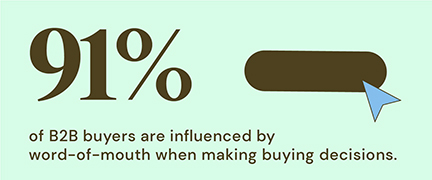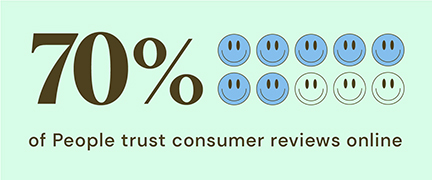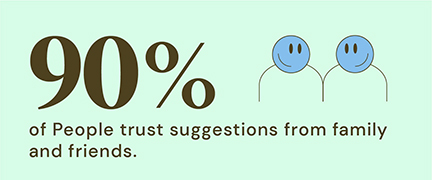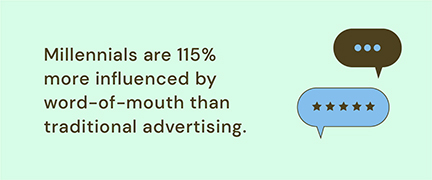Word-of-Mouth Marketing: How to Build a Successful Strategy
- Jun 9, 2022
- 10 min read

One of the most effective marketing strategies is word-of-mouth. Think about it: would you rather listen to a random guy on an infomercial or a direct recommendation from your business mentor? In this article, we’ll dive into what word-of-mouth marketing actually means and how you can successfully leverage it for your business today.
No matter how good of a salesman you are, there’s nothing more convincing than an unsolicited recommendation from a happy customer — whether that’s your friend recommending his family dentist, or your uncle raving about the latest video game.
One thing’s for sure. Humans buy from humans, which makes word-of-mouth marketing one of the most effective ways to get the word out about a business. Think about it. Would you rather listen to a random guy on an infomercial or a direct recommendation from your business mentor? But word-of-mouth marketing comes in all shapes and sizes: comments under blog posts, hashtags, shout-outs, and product reviews.
In this article, we’ll dive into what word-of-mouth marketing actually means and how you can successfully leverage it for your business today! Let’s get started.
What is Word-of-Mouth Marketing?
Word-of-mouth marketing, WOM or WOMM for short, is also referred to as word-of-mouth advertising. It’s defined as the organic marketing process that occurs when consumers create conversations around a company’s products or services with a friend, family, and network.
WOM marketing is one of the most powerful forms of advertising as consumers trust their friends 92% more than traditional media. Traditional marketing often comes in the form of paid advertising where brands pay to place a message in front of as many people as possible. This is often referred to as ‘push’ marketing. In contrast, word-of-mouth marketing focuses on organic discussions and user-generated content to market your brand.
Pre-internet, word of mouth was exactly that — the word is shared by mouth. But with the advent of the blazing fast internet connections, social media, and the instant exchange of information, the definition of ‘mouth’ has become much broader.
In the digital era...
Word of mouth marketing today can range from publicity, viral buzz, content, tweets, Instagram reels, and more. It’s less focused on the medium, but more about how ideas are spread: brand advocates spreading the word about your business.
WOM may occur by chance or sheer luck but can be encouraged, curated, and crafted to a brand’s advantage. When one person shares a feeling, a message, an experience, or an idea about a brand, it is triggered by a defining experience. It may be by exceeding expectations on a product, by providing excellent customer service, or by enabling your audience to spread the word about your business.
Why is Word-of-Mouth Marketing So Important?
The advertising landscape is changing. It’s not a pay-to-win model anymore. Advertisers can’t just simply throw money for TV ad placements and expect it to be a success. You may be recognizable, but you can’t build a relationship that way.
Successful marketing goes beyond the purchase and delights your customers to the point where they advocate for you — for free (sort of).
With word-of-mouth marketing, the brand’s responsibility is to ensure your brand advocates are empowered to share about your brand, are heard, and amplified. At the end of the day, people are becoming more skeptical of advertising. 90% of people are more likely to trust a recommended brand, even from a stranger. Again, people buy from people.
Here are a few reasons why you should deploy a WOM strategy.
Build Brand Equity
A successful word-of-mouth marketing campaign is focused on the long term. It takes time to build awareness, communicate brand values, shape the way your customers feel about you, and build deeper connections. This is achieved by taking action on things that don’t scale such as providing top-of-the-line customer service, building a one-of-a-kind product, or crafting an unforgettable user experience (jump to the strategy section for a deeper dive). As a result, brands that have managed to accomplish this have built incredible brand equity and loyalty. They provide much more than material value – WOM builds emotional value, trust, and loyalty.
Build Relationships With Your Audience
A brand that listens succeeds.
Word of mouth marketing requires two-way communication between the brand and customer. The brand needs to first and foremost listen to what the customers are saying to improve their business to a point where they exceed their expectations. Once achieved, customers will shout from the rooftops about your business.
In the end, viral campaigns aren’t sustainable and hardly replicable. WOMM helps create a long-term strategy that grows with the business and drives social engagement and buzz, which can help you grow faster than if you rely on paid advertising.
Drive Your Bottom Line
An organic and unforced marketing strategy will ultimately drive revenue. There’s always a place for banner ads and Facebook ads, but few advertising techniques come as close to bottom-of-the-funnel as a WOMM strategy. Looking at it from a content marketing perspective, sales teams often utilize video case studies and one-pagers to help aid the sales process. Although not quite WOM, people want to hear real, impactful stories about how a business has helped others like them.
Word-of-Mouth Marketing Stats
Not convinced that WOMM is for you? Here are the latest and greatest statistics to convince you otherwise.
Consumers with referrals from friends are 4x more likely to make a purchase.
90% of people trust suggestions from family and friends.
More than 74% of consumers identify word-of-mouth as an important influence in their buying decisions.
Consumers look to recommendations among the top five influences on their purchasing decisions. before making a purchase.
70% of people trust consumer reviews online.
85% of website visitors feel visual user-generated content is more influential than brand photos or videos. 72% of people get news from friends and family, making word-of-mouth the most popular channel for sharing.
91% of B2B buyers are influenced by word-of-mouth when making buying decisions.
On social media, 58% of consumers share their positive experiences with a company and ask family, colleagues, and friends for their opinions about brands.
Almost as many people trust online reviews written by fellow consumers as they do personal recommendations.
Consumers discuss specific brands casually 90x per week.
Millennials are 115% more influenced by word-of-mouth than traditional advertising.
Almost 83 percent of consumers say they completely or somewhat trust word-of-mouth recommendations, ranking these recommendations as the most reliable source of information.
85% of small businesses attribute word-of-mouth as the greatest source of new business.
Types of Word-of-Mouth Marketing
As mentioned above, there are various types of word-of-mouth marketing. Here are the main categories:
User-Generated Content
User-generated content, or UGC for short, is content created and shared by consumers. This goes hand in hand with community marketing, where customers create videos, blog posts, podcasts, and photos of your products and services. While successful brands with cult followings will have superfans creating content without being prompted to do so, brands can encourage customers to create content by using the following techniques:
Ask provocative questions on social media. Ask people to share their stories, experiences, and thoughts about your product in an interesting way.
Start and nurture an engaging community. Whether it’s a forum or a Facebook group, encourage your customers to engage in in-depth discussions.
Have a unique perspective. You can position yourself as a thought leader and present new and interesting ideas that drive interesting conversations organically.
Social Media Marketing
Whether it’s brand mentions, building relationships with influencers, or managing branded hashtags, social media is a powerful medium to execute a successful word-of-mouth marketing campaign. Curating and posting relevant content that resonates with your audience is only half the battle. The other half is social listening and actively engaging with your customers. Here are a few ways you can do so:
Use a social listening tool to track every brand mention, tag, product shoutout, and relevant hashtags to see what people are saying about your brand
Show genuine appreciation for positive feedback and comments. Conversely, ensure you have a protocol in place to swiftly manage complaints and negative reviews.
Amplify positive stories, reviews, and comments by sharing them on your accounts.
Build genuine rapport with influencers in your sphere to help amplify your message.
Employee Advocacy
If you don’t have much of a social presence, employee advocacy can help spread your message within their own individual networks. In order to get your employees engaged and active, you need to do two things:
Create engaging content that is entertaining, valuable, and useful. Have them share something that they’d be proud of!
Make the sharing process as easy as possible. Whether you’re providing writing prompts, reviewing their social copy, or using an employee advocacy platform, ensure you make it as easy as possible for them to share your content.
Referral Marketing vs Word of Mouth Marketing
Many people use referral marketing and word-of-mouth marketing interchangeably. The concept is definitely similar in many ways. Referral marketing utilizes a paid network to drive traffic or sales. Whether it’s links on a blog post or affiliate links on a TikTok channel, brands pay a fee per referral. Word of mouth marketing though is completely organic.
Before we dive into the intricacies of executing a word-of-mouth marketing strategy, it’s integral to note that no amount of marketing can sell a bad product. Conversely, a great product with an exceptional experience makes WOM a breeze. Now that we’ve got that out of the way, let’s talk strategy.
How to Build a Word-of-Mouth Marketing Strategy
Monitor Mentions and Respond Quickly
An effective WOM strategy starts with practicing meticulous social listening. Whether it’s using services like Google Alerts, Mention, or Meltwater, it’s integral to have a pulse on who is speaking about you. Set up alerts on any brand or product mentions and try tracking relevant hashtags on social media platforms.
Taking it a step further, some social listening services offer sentiment analysis, to provide a breakdown of not only what people are saying, but how they feel about it as well. Once you find the pulse, be sure to also respond quickly and take up engagement opportunities as they arise. Timing is everything on the internet – a meme, tweet, or TikTok can be the topic of the day and forgotten the next!
Amplify Customer Stories and Positive Comments
An additional benefit to social listening is that you’ll be able to identify happy customers that are talking about your product or service. They could post an Instagram story or even mention your brand in a YouTube video. When you spot these positive comments and stories, be sure to amplify their voice in the form of a retweet, reshare, or even a repost. Also consider repurposing the content on your blog, in your advertising, or even on your website. Be sure to show your appreciation and engage in a genuine way!
Launch an Employee Advocacy Program
As mentioned above, employee advocacy can be key to growing your initial audience. Each employee at your business has their own network of friends, family, and fans – so use it to leverage it to your advantage. Tread carefully of course by making sure your content is something they’d be proud of. Lastly, avoid any forced initiatives that may seem disingenuous to your audience – it could do more harm than good.
Incentivize Your Ambassadors To Leave Reviews
Positive reviews can make or break your business. In a world where 70% of people trust online customer reviews, it’s integral to maintain your brand’s reputation. If you have a good pulse on your most loyal customers, influencers, and brand ambassadors, you can easily source positive reviews and feedback on review sites. If you’re running a restaurant, you may follow up with a happy customer through a text encouraging them to leave a review in exchange for a free drink on their next visit. For SaaS companies, consider sending out Net Promoter Score (NPS) surveys and ask for the top-rated reviewers to leave a platform review.
Provide Unmatched Customer Service
A single negative customer experience can be amplified on social media within seconds. This is especially beneficial with social-media customer service, where a few clicks are all it takes to discuss anything. Ensure that you’re providing excellent customer service to have your customers rave about your business rather than call you out online.
Word-of-Mouth Marketing Examples
Now you know the most important aspects about word of mouth marketing, let’s dive into a few of the greatest examples to inspire your next WOMM campaign.
Scrub Daddy
Proudly holding the self-proclaimed title of “America’s best sponge company,” Scrub Daddy has unconventionally created a loyal fan base for one of the most common household products on the market. They’ve created a sustainable WOM strategy that lasts. Starting from a flawless pitch on the network TV show Shark Tank, Scrub Daddy innovated a product that, for the lack of a better word, disrupted its category. The foundation of their loyal fan base was built on a one-of-a-kind product. They have sustained their ‘virality factor’ by producing hilarious TikTok content that speaks to their customer base in a genuine (and often crude) way. They took a risk and it worked. Their increased brand loyalty and engagement have allowed them to expand their product lines into full sponge sets, a spinoff called Scrub Mommy, and more.
https://www.tiktok.com/@scrubdaddy/video/7056849395874008367

Starbucks
The global coffee powerhouse wasn’t established by making great coffee. They’ve carefully curated their entire drinking experience from the visual branding, to the store layout, customer service, mobile app, and community building – which presents Starbucks as the perfect WOM case study. It’s not one viral drink that made them famous, but every moving piece has helped them stay engaged with their customers.
One of the most important factors of Starbucks’ WOM strategy is the product design. Every Starbucks cup has its name written on it, and the brand is so well-known that it acts almost as a status symbol compared to other more affordable coffee chains. Some consumers value a pricey Starbucks drink as a treat or luxury, which motivates them to share their drink on social media. The ubiquitous coffee chain also encourages customers to order off a secret menu and customize drinks to their hearts’ desire — making every experience uniquely fun and shareable.

Tesla Referral Program
CEO Elon Musks’ position on advertising has remained consistent throughout his tenure at Tesla: avoid all traditional advertising. There’s a deliberate reason you won’t see a TV ad about the market leaders in EV. While the eccentric figurehead generates consistent buzz around the world, Tesla’s WOM strategy is focused on current Tesla owners convincing friends, family, and colleagues to purchase Teslas of their own. However, the Tesla driving experience is what sells and gets others to want to buy it. What better way to experience autopilot for the first time than to borrow your friend’s car? This is the same reason they don’t have dealerships and only showrooms where you can test drive the car and enjoy the experience of driving a luxury electric vehicle. Tesla also has a very active motor club, where they encourage meets and discuss Tesla news, and features. Lastly, Tesla’s referral program incentivizes Tesla drivers to refer their networks as well.
In Summary
Word-of-Mouth Marketing is a no-brainer for any business, but not many can execute it well. As we discussed in this article, it takes a great product, excellent customer service, and community management to ensure your brand is shared with the world. Whether it’s a sponge, an electric vehicle, or a cafe, word-of-mouth marketing can ultimately help you grow your customers to become ambassadors for life.
We can help with your marketing!
A beautifully designed brand and website will help your business' emails STAND OUT from your competition. Creative Instinct can help! To inquire, email gwen@creativeinstinct.biz. Learn more at www.creativeinstinct.biz/services.
Original article by Matan Naveh, Elementor.com; link: https://elementor.com/blog/word-of-mouth-marketing/






Comments